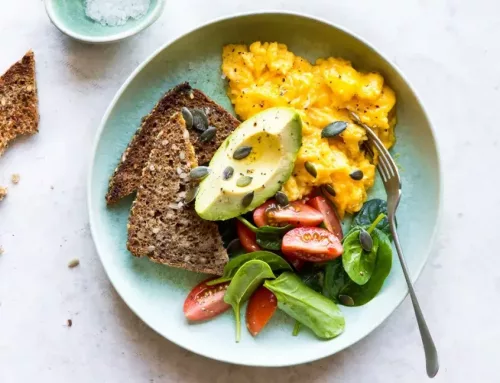For years, coconut oil was relegated to the list of “bad foods.” We avoided it like the plague, convinced by so-called experts that it would lead to problems ranging from high cholesterol to heart disease. Recent studies, however, have given coconut oil the green light, showing that it offers benefits ranging from healthy levels of cholesterol to weight loss. At the same time, more experts are recommending low carb high fat (LCHF) ketogenic diets for similar benefits. We asked one of the world’s leading nutrition experts, Jonny Bowden, to clarify. He’s the author of “The Great Cholesterol Myth: Why Lowering Your Cholesterol Won’t Prevent Heart Disease-and the Statin-Free Plan That Will” (click for details) and “Living Low Carb: Controlled-Carbohydrate Eating for Long-Term Weight Loss.”
Jonny cites studies in the Trobriand Islands that evaluated native populations. About 80 percent of their diets were from coconut-based products. And despite the fact that those foods were high in saturated fat, the researchers discovered minimal heart disease. What’s the reason? “Coconut oil contains extremely healthy fatty acids like lauric acid which are anti-microbal. Coconut oil also helps to produce beta-hydroxy-butrate, one of the important ketone bodies our brain can use for energy. And it’s great for the immune system,” explains Jonny.
With regard to weight loss, most of the fat in coconut oil is MCT (medium chain triglycerides), “which the body prefers to use for energy rather than storage,” he added. As a result of these benefits, Jonny says that the organic varieties available now qualify coconut oil as a superfood, earning a star in his book “The 150 Healthiest Foods on Earth: The Surprising, Unbiased Truth About What You Should Eat and Why.”
Studies support his views. A Harvard study in the American Journal of Clinical Nutrition revealed that “greater saturated fat intake is associated with less progression of coronary atherosclerosis, whereas carbohydrate intake is associated with a greater progression.” Moreover, Jonny cites “the famous Framingham, Mass., heart study, the more saturated fat one ate, the more cholesterol one ate, the more calories one ate, the lower the person’s serum cholesterol.” Researchers found that “people who ate the most cholesterol, ate the most saturated fat, [and] ate the most calories weighed the least and were the most physically active.”
However, Jonny does emphasize that choosing the right brand is important. Look for “wonderful, organic coconut oil (like Barlean’s for example),” he adds.
If you’re not sure about how to cook with coconut products, Jonny’s authored several cookbooks to help: “The 150 Healthiest 15-Minute Recipes on Earth: The Surprising, Unbiased Truth about How to Make the Most Deliciously Nutritious Meals at Home in Just Minutes a Day” (click for details) and “The Healthiest Meals on Earth: The Surprising, Unbiased Truth About What Meals to Eat and Why.” The latter book also includes details on how to cook with coconut oil, shop for it and use it in other ways.
We asked Jonny for his views on low carb high fat (LCHF) ketogenic diets. Here are some key points from Jonny:
You do not need to be in nutritional ketosis in order to lose weight.
Some people cannot lose without going into ketosis, but they are rare. As an example, Jonny cites Jimmy Moore, author of “21 Life Lessons From Livin’ La Vida Low-Carb: How The Healthy Low-Carb Lifestyle Changed Everything I Thought I Knew” and an upcoming book: “Keto Clarity: Your Definitive Guide to the Benefits of a Low-Carb, High-Fat Diet.”
Ketosis for fat loss is different than ketosis for health.
Jonny notes that some people “try consciously to stay in nutritional ketosis NOT because they want to lose weight, but because they believe, not without reason, that it has health benefits way beyond fat loss. Famous example: the great neurologist and NY Times best-selling author of Grain Brain, David Perlmutter, who, incidentally, is as lean as a pole.” (Note: For more information about “Grain Brain” and renowned neurologist David Perlmutter, click here.)
The problem that many LCHF dieters experience: Getting into ketosis. “If you’re trying to get into ketosis for whatever reason, the level of carb consumption you’ll need to go to is going to be variable,” cautions Jonny. “Some folks have to go ridiculously low—10 grams a day (a couple handfuls of lettuce). Some can go as high as 50 grams a day. Almost no one will be in ketosis as 100 grams a day, so the range is somewhere in there.”
A new trend in the diet world attempts to stay true to the old philosophy of demonizing fat while following the new rule “low carb is good.” Can you really go on a low fat AND low carb diet? We asked Jonny, who bluntly shared his expert opinion:
I think low carb low fat diets are idiotic. I see absolutely nothing beneficial about avoiding fat. It’s a silly idea which is way past its expiration date, kept alive by ridiculous, antiquated organizations like the American Dietetic Association and their official Stepford-wife “spokespeople”. In addition, for diets to be both low in carbs and low in fat, they would have to be very high in protein (or you’d starve). That’s OK for some people, but the smartest advocates of high protein diets (Mike and Mary Dan Eades, for example) would scoff at the idea of a low fat version of a high protein diet.
Note: If you’re not familiar with the Eades and their approach to low carb diets, we highly recommend “Protein Power: The High-Protein/Low Carbohydrate Way to Lose Weight, Feel Fit, and Boost Your Health-in Just Weeks.” The book proved to be a literal life saver for a friend who suffered a severe stroke in his 30s. After being diagnosed with high cholesterol, high blood pressure and a roster of other problems, he was told to lose weight and used this book as his guide. Result: He reversed all his problems, lose the excess pounds and stays true to the principles of the Eades’ diet plan.
We also asked Jonny for his views on the percentage prescriptions that some emphasize (e.g. 20 percent carbohydrates, 60 percent fats, 20 percent protein).
“I’m not a huge fan of prescribing percentages for two main reasons: One, no one does them. Most American’s can’t calculate the tip on a 10 dollar restaurant bill. You think they can calculate percent of calories from protein? Good luck with that,” he commented.
And Jonny adds an additional caveat when it comes to percentages. “Two: Protein requirements don’t come in percentages. They come in absolute amounts. Example: You’re a 100 pound woman on a 1200 calorie diet and you’re eating 10% protein. That means you’re getting 120 calories from protein, or 30 grams a day. That’s ridiculously insufficient. Compare this to a 10% protein diet for a 240 pound bodybuilder eating 5000 calories a day. HIS 10% is going to be 500 calories from protein, or 125 grams. Percentage really doesn’t tell us much.”
However, for those insisting that they can only calculate their meals based on the percentage philosophy of dieting, Jonny offers up these thoughts: “I’d go with 40/30/30 (40% fat 30 protein 30 carbs). For weight loss, many resistant people will need to lower the carbs even further. For people who are NOT carb sensitive (i.e. insulin resistant, weight loss resistant) they might even use the 40/30/30 template of my friend Barry Sears, which is 40% CARBS, 30% protein and 30% fat.) For general , dumbing down purposes, I’d say a third of your plate on each macronutrient with a glass of red wine once a day and a square of dark chocolate for dessert.”
And as for calorie-counting? “Calorie counting is like the training wheels on a bike. Useful for learning purposes, useless as a way of living on a regular basis,” opines Jonny.
One issue that has become increasingly controversial: Do low carb high fat (LCHF) dieters need to stay in ketosis in order to reap the benefits? Or is it sufficient to cut sugar and starch while boosting healthy fats and eating protein and veggies? Jonny offers the most insightful response that we’ve found: “In my opinion, the obsession with staying in or being in ketosis is a lot of energy spent on something that may not be as important as these folks think,” he says.
I DO believe you can get the enormous benefits of sugar/starch reduction diet without hitting ketosis, and i also believe that a LOT of people have trouble getting into it. I ate less than 50 grams a day for a week and couldn’t budge the needle, and I was using a blood test. (Of course, you could say that had i gone to 10 grams– 3 small handfuls of lettuce– I would have gotten there. Probably. The point is whether it’s worth it.)
And that’s the million dollar diet question: Is it worth eating entire sticks of butter washed down with coconut cream? “Apparently, to the advocates of living ketogenically, it seems to be. For the average person? I don’t know. and I’m not sure anyone else does either,” says Jonny candidly.
But here’s the catch 22: “There are no “studies” of people “flirting” with ketosis vs “in” ketosis where we could actually see what happens in real life. We have good info to base guesses on but they are just guesses.”
We also asked him to comment on weight loss supplements. And despite Dr. Mehmet Oz’s “miracle weight loss supplement” discoveries that average one a week, Jonny takes a pragmatic view: “Number one with bullet: Fiber.”
Although some exist with what he terms “decent research” backing their use that “may work synergistically,” Jonny feels that “overall, any of the popular widely promoted weight loss supplements or “fat burners” (esp the ones seen on infomercials) are a complete waste of time and money.”
He notes that “some may have some limited value, or some value when used in combination AND in conjunction with a really smart lower carb diet. (My own New You in 22 program had a supplement designed with this in mind called Metabolic Fire, designed by one of the top supplement formulators in America and based on research. But even that won’t work if you don’t eat the right stuff.) Most people don’t use them in conjunction with the right diet, and the hype and claims way outstrip any real value.”
Want an example? Contemplate raspberry ketones, which Dr. Oz proclaimed to be a miracle “Fat-Burner in a Bottle.” As a result, sales soared, and manufacturers couldn’t keep them in stock. Jonny’s view? “Raspberry ketones? You’ve got to be kidding.”
Our experience: We received two complimentary bottles of raspberry ketone supplements to try. Great smell, pretty bottle, no impact after using one of the bottles precisely as directed. However, when we poured the other bottle into our stinky garbage disposal and ground it up, it proved to be a very effective holistic cleanser. Albeit expensive. Our verdict: Save your money on that miracle “money burner in a bottle” (er, we mean fat burner) and use fresh lemons to clean your disposal instead.




